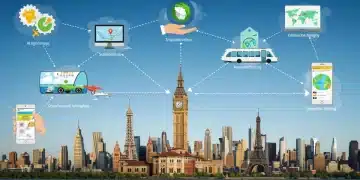Travel technology adoption in hospitality: a game changer

Travel technology adoption in hospitality revolutionizes guest experiences and operational efficiency through AI, contactless services, and sustainability practices, ensuring businesses meet evolving customer needs.
Travel technology adoption in hospitality is reshaping the way hotels and restaurants operate. Have you ever wondered how technology enhances your stay or dining experience? Let’s delve into the solutions that are making waves in the industry.
Understanding travel technology
Understanding travel technology is essential in today’s hospitality industry. This technology encompasses a range of tools that help streamline operations and enhance guest experiences. From booking systems to in-room smart devices, technology is transforming how hotels function.
Technology in travel can be categorized into several main areas.
Types of Travel Technology
There are numerous types of technologies that play a crucial role in the hospitality sector. Some of the key categories include:
- Booking engines: Allow guests to make reservations easily through websites and apps.
- Property management systems: Help manage reservations, payments, and guest information.
- Customer relationship management (CRM): Enable hotels to maintain and analyze customer interactions.
- Smart technologies: Integrate IoT devices for enhanced guest convenience.
These technologies not only improve efficiency but also provide valuable data that can inform future strategies. Hotels can analyze guest preferences, which leads to personalized services that enhance satisfaction.
Another important aspect of travel technology is its ability to facilitate communication. Hotels can utilize apps to update guests on amenities, services, and events in real time. This keeps guests informed and engaged, making their stay more enjoyable.
Benefits of Understanding Travel Technology
Being knowledgeable about travel technology brings numerous benefits for both hospitality providers and guests. For instance, it allows hotels to stay competitive in a fast-paced market. Moreover, understanding technology helps in:
- Enhancing guest experiences: Personalized service can be delivered effectively.
- Increasing operational efficiency: Automation reduces human error and saves time.
- Collecting valuable data: Analysis of trends can improve service offerings.
As the industry progresses, staying updated on technology trends becomes more important. Adapting to new tools can result in better guest retention and satisfaction. In conclusion, understanding travel technology is not just an asset; it is a necessity for success in the hospitality industry.
Benefits of adopting technology in hospitality

The benefits of adopting technology in hospitality are significant and far-reaching. As hotels and restaurants integrate more technological solutions, they can improve efficiency and enhance customer experiences. Understanding these benefits helps businesses stay competitive and responsive to guest needs.
One major advantage is the ability to streamline operations. Automated systems can handle bookings, payments, and guest requests efficiently. This reduces wait times and allows staff to focus on more personal guest interactions. When technology is effectively integrated, it creates smoother workflow processes.
Enhanced Guest Experience
Another key benefit is enhancing the overall guest experience. With technology, hotels can offer:
- Personalized services: Technology can help track guest preferences, allowing tailored recommendations during their stay.
- In-room automation: Smart devices such as voice-controlled systems allow guests to adjust lighting and temperature easily.
- Mobile check-in: Guests can check in from their phones, reducing the time spent at the front desk.
- Real-time communication: Apps enable guests to communicate directly with staff, making requests seamless.
These innovations not only make stays more enjoyable but also increase guest loyalty. When guests feel valued through a personalized approach, they are likely to return and recommend the hotel to others.
Increased Operational Efficiency
Adopting technology also leads to increased operational efficiency. Hotels can better manage resources by utilizing data analytics. For instance, understanding peak booking times helps optimize staffing levels.
Cost savings can be realized through energy management systems, which help reduce utility bills by monitoring usage patterns. Additionally, maintaining equipment is easier with predictive maintenance technologies, preventing costly breakdowns. All these factors contribute to a more sustainable business model.
In conclusion, embracing technology in the hospitality industry opens doors to numerous advantages. From enhancing guest experience to improving operational efficiency, the benefits are undeniable and essential for modern success.
Implementing technology solutions
Implementing technology solutions in the hospitality sector is key to enhancing operations and guest experiences. This process involves several steps that help ensure a smooth transition to using new technologies. It’s important for businesses to understand how to integrate these solutions effectively.
First, assessing the specific needs of your establishment is essential. This assessment can guide decisions on which technologies will be most beneficial. Consider feedback from staff and guests to identify areas that could use improvement.
Choosing the Right Technology
There are various types of technology solutions available. Selecting the right one can greatly impact efficiency and guest satisfaction. Common technologies that hotels adopt include:
- Property Management Systems (PMS): These systems manage bookings, check-ins, and check-outs efficiently.
- Online Booking Platforms: Allow guests to make reservations easily through multiple channels.
- Point of Sale (POS) Systems: Used in restaurants to handle transactions and orders swiftly.
- Customer Relationship Management (CRM): Helps track and understand guest preferences.
Once the technology is chosen, the next step is training staff. Providing comprehensive training ensures that employees are comfortable using the new systems, which minimizes disruption to daily operations. It’s also beneficial to offer ongoing support as staff adapt to these changes.
Integration and Testing
After implementation, integration with existing systems is crucial. Testing the new technology through pilot programs can reveal potential issues. This phase allows businesses to make necessary adjustments before a full rollout.
Continual feedback from both staff and guests during this phase is key. Collecting data on guest experiences with the new technology can help fine-tune processes. This ensures the technology meets the needs of the hotel and enhances guest satisfaction.
Ultimately, implementing technology solutions is an ongoing process that requires adjustment and evaluation. It is not just about installing new tools; it’s about fostering a culture of innovation and customer service.
Future trends in hospitality technology

The future of hospitality technology is bright and continuously evolving. As the industry embraces innovation, new trends are emerging that promise to reshape guest experiences and operational efficiency. Staying informed about these trends is vital for hotels and restaurants aiming to succeed in a competitive landscape.
One major trend is the rise of artificial intelligence (AI). AI can enhance various aspects of hospitality, from chatbots that assist guests with inquiries to predictive analytics that help understand guest preferences better. By utilizing AI, businesses can create a more personalized experience.
Contactless Solutions
Another significant trend is the move towards contactless solutions. Due to the ongoing effects of the pandemic, many guests prefer to minimize physical interactions. This shift has led to the adoption of:
- Mobile check-in and check-out: Guests can complete these processes using their smartphones, streamlining arrival and departure.
- Digital menus and ordering: Restaurants are offering QR code menus that allow guests to browse and order directly from their phones.
- Smart room controls: Guests can adjust lighting, temperature, and entertainment systems via their devices.
- Contactless payments: Digital wallets are becoming the preferred method for transactions in hotels and restaurants.
The adoption of these technologies enhances guest security and convenience. It allows guests to feel more comfortable while enjoying their stay or dining experience.
Sustainability and Eco-Friendly Technology
Furthermore, sustainability is a significant focus for future advancements in hospitality technology. Hotels are increasingly using eco-friendly technologies. This includes energy-efficient systems and waste management solutions designed to minimize environmental impact.
Guests are becoming more aware of their carbon footprint and prefer establishments that prioritize sustainability. Implementing green technologies not only attracts eco-conscious consumers but also contributes to long-term cost savings, making it a win-win for businesses.
Finally, the integration of the Internet of Things (IoT) is expected to expand further in the hospitality sector. IoT devices can monitor guest behaviors and adjust services automatically. For example, if a room is unoccupied, temperature controls can adjust to save energy. This integration increases efficiency while enhancing the guest experience.
In summary, the future of hospitality technology is promising and full of opportunities. Embracing AI, contactless services, and sustainable practices will not only enhance guest satisfaction but also lead to operational efficiency. By staying informed about the latest trends, hotels and restaurants can ensure they meet the evolving needs of their customers. Adapting to these changes is essential for success in the competitive hospitality industry.
FAQ – Frequently Asked Questions about Hospitality Technology
What role does AI play in hospitality?
AI helps personalize guest experiences, manage bookings more efficiently, and analyze data to understand customer preferences better.
How can contactless services enhance guest experiences?
Contactless services, like mobile check-ins and digital ordering, increase convenience and safety, allowing guests to enjoy seamless interactions.
Why is sustainability important in hospitality technology?
Sustainability attracts eco-conscious guests and reduces operational costs, making it beneficial for both the environment and the business.
What is IoT and how does it impact hospitality?
IoT refers to connected devices that can monitor and improve hotel operations, enhancing guest experiences by adjusting services based on real-time data.





